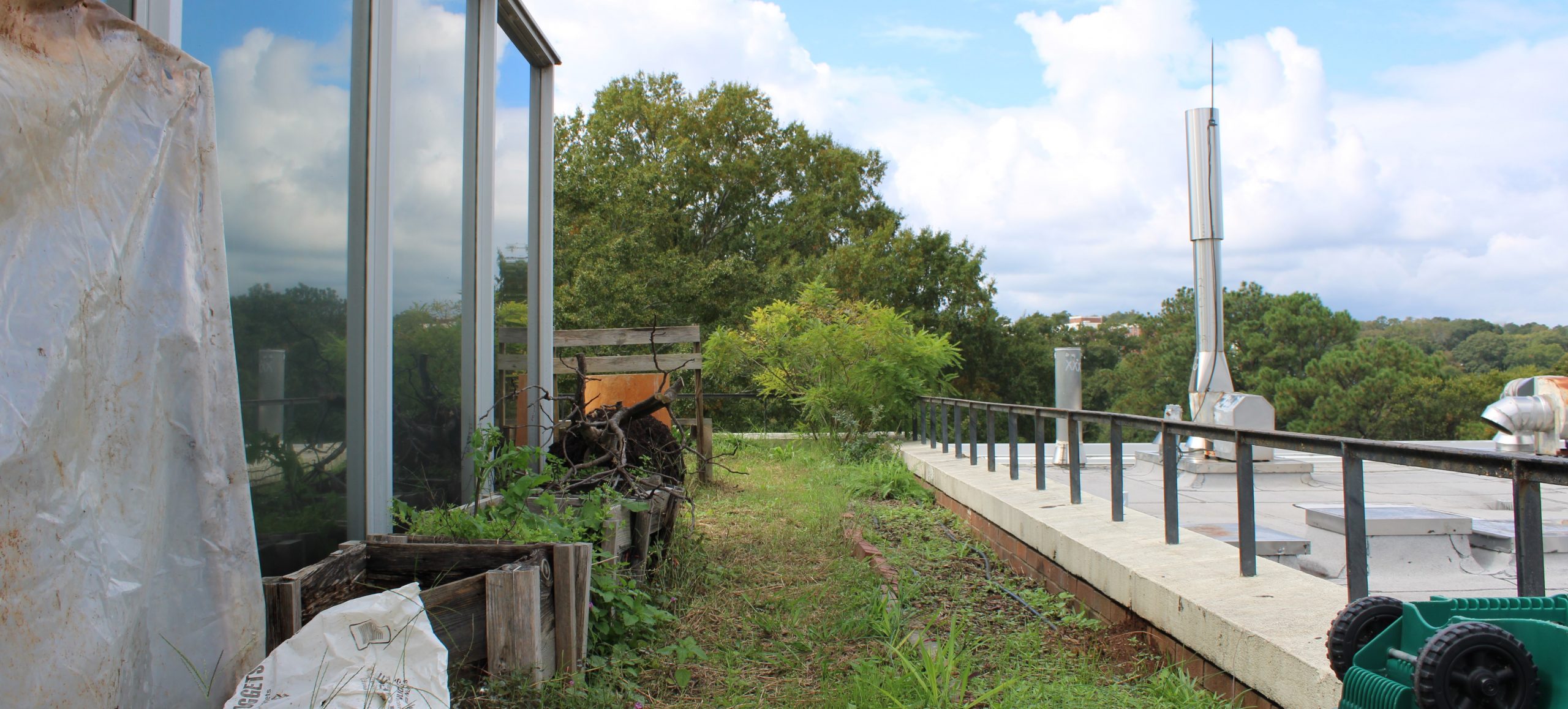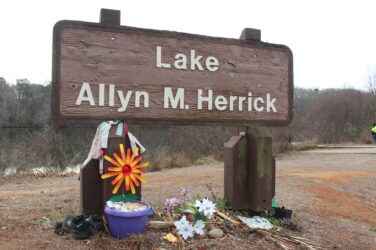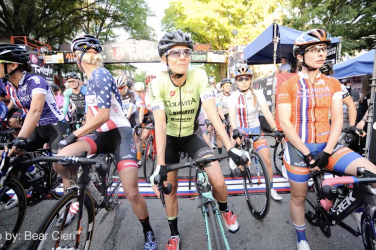Due to the mandated University of Georgia campus closure in the wake of the global COVID-19 pandemic, Abbie Dillon, the Office of Sustainability’s Urban Agriculture intern working to maintain the Green Roof Garden, was barred from campus and forced to abandon numerous crops.
As a result, the Green Roof Garden lost an entire season’s harvest. The fruits and vegetables which would normally have been sent to various local organizations to feed food-insecure households in Athens lay dead atop the garden.
Listen “When I came back, it was a complete jungle up there,” Dillon said.
Amy Trauger, UGA geography professor and supervisor of the Urban Agriculture intern, petitioned endlessly to have Dillon considered an essential worker, but her requests fell on deaf ears.
Listen “I wasn’t able to go up there. No one was, so we just had to abandon it. It’s sad to me that something that’s alive is not considered essential,” Trauger said.
Now that she is allowed back on campus, Dillon will continue to work as the Office of Sustainability’s Urban Agriculture intern until she graduates in the spring. She is currently dedicating three days a week to maintaining the rooftop and working the crops in order to restore the garden to its former glory.
Horticulture History
The University of Georgia’s Green Roof Garden was constructed on the roof of the Geography-Geology building in the 1960’s.
Its initial and sole purpose at the time was to act as a temperature buffer for the Climatology Research Laboratory housed on the building’s top floor, as the lab’s measurements were beginning to be artificially heightened because the building’s structure was trapping heat, according to Trauger. This phenomenon is known as the heat island effect.
A heat island is an urbanized area, such as a road or building, which experiences an average of one to seven degrees Fahrenheit higher than temperatures in surrounding rural areas, according to the United States Environmental Protection Agency.
The grass and soil of the Green Roof Garden absorb the sun’s rays and mitigate this warming effect. The garden then uses the sun and rain as food for the various plants grown atop the building, according to Trauger.
When Amy Trauger joined the team in 2008, she was shocked by the lack of soil health and the unsustainability of the garden.
Listen “I went up there, and I was like ‘The soil here is so tired.’ It had not seen any kind of care in 60 years,” Trauger said. “I wanted to have it more self-sustaining.”
Using her own farming background, Trauger began to incorporate gardening techniques known as permaculture gardening. Permaculture involves working with the local environment to encourage the most sustainable food growth possible within a pre-established ecosystem, according to the Permaculture Association.
What It Grows and Where It Goes
In the 1960s, the Green Roof Garden was just soil and grass. Sixty years later, it’s a completely sustainable public garden providing free, healthy food to Athenians in need, according to Trauger.
Listen “Any time healthy food is more prevalent in a community, that’s going to be more beneficial for everybody,” Dillon said.
The garden grows approximately 200 pounds of produce a season, according to Dillon. Tomatoes, peppers, okra, blueberries, blackberries, squash and leafy vegetables overtake the 3,000 square feet each year.
Quickly after Trauger joined the team, the garden developed a long-term relationship with UGA Campus Kitchen. Campus Kitchen is a “student-powered hunger relief program of the UGA Office of Service-Learning” which provides free meals to the Athens food insecure, according to the Campus Kitchen website.
Athens-Clarke County has one of the highest food insecurity rates in Northeast Georgia with over 20,000 people, including over 4,000 children, experiencing food insecurity, according to Feeding America.
Feeding America is the nation’s largest domestic hunger relief organization with a network of 200 food banks and 60,000 food pantries across the country, according to their website.
Since the partnership between the Green Roof Garden and Campus Kitchen began, every harvest has been going directly to food insecure people in Northeast Georgia – people like Rebecca Richardson.
Richardson began caring for her three grandchildren after her daughter passed away. Since then, the produce from the Green Roof Garden outsourced through Campus Kitchen has been helping her “focus on other problems.”
“People have many worries, and Campus Kitchen takes one of those off our minds,” Richardson told Campus Kitchen.
Though it is the only garden of its kind currently on the Athens campus, Ryon Cobb, assistant professor of Sociology researching the health consequences associated with social inequality such as poverty and food insecurity, is encouraged by the success the garden has had so far.
Listen “Anything that leads to more health during a COVID epidemic, strengthening your immune system is a positive thing… I’m not going to say it’s a cure all, but it’s not bad,” Cobb said.
In addition to free food for an area’s food insecure, he would also like to see an increase in community policing, as well as more investments into the area and more investments into jobs. to improve the overall quality of life in Athens’ poverty-ridden areas.
Location Limitations
The garden has consistently delivered free, healthy food to dozens of families every season besides last summer, according to Dillon.
Though completely environmentally sustainable, the garden still depends on volunteers and interns like Dillon to harvest the crops at the end of the season. During times of mandated campus closure such as the closure due to COVID-19, the garden cannot survive.
Similarly, because it’s on top of a multi-story building, the garden is not very accessible to students and visitors.
Listen “Still a lot of people don’t see the garden. It’s kind of hard to get to. It’s just not really the communal space that I wish the garden would be,” Dillon said.
Though those who tend the garden aspire to educate the local community about gardening and food production, this goal is heavily limited by the garden’s location.
Listen “My goal would be to have community gardens just interspersed everywhere so that people can just see how easy it is to grow your own food on just a really small scale and get people more connected to food,” Dillon said.
Feeding the Future
Though the Green Roof Garden lost an entire harvest due to the COVID-19 campus closure, it has almost been restored back to its former glory due to the work of Dillon and local volunteers.
Listen “She’s done a great job. It’s definitely getting close to where it was before,” Trauger adds.
The garden is on track for its next harvest and even looking to expand.
Listen “I’m hoping that we’ll eventually expand and have more community gardens on campus,” Dillon, who is in the middle of writing grants to receive funding for more gardens, said.
Nele Langhof is a senior majoring in English in the Franklin College of Arts and Sciences and journalism in the Grady College of Journalism and Mass Communication at the University of Georgia.









Show Comments (1)